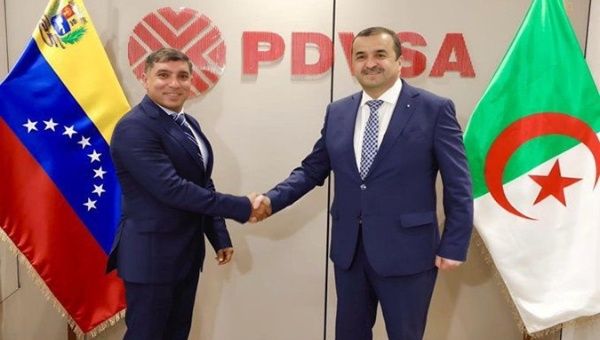
CARACAS, Feb 26 (NNN-TELESUR) — Joint business opportunities in the gas sector between Venezuela and Algeria were evaluated by the Venezuelan Minister of Petroleum, Rafael Tellechea, and the Algerian Minister of Energy and Mines, Mohamed Arkab, during their meeting in the middle of this week.
During the meeting held in Caracas, both authorities reviewed the framework of possibilities for the use of gas as a transition fuel that allows reducing the environmental impact, as well as its practical application in the development of the petrochemical industry.
Tellechea, who is also President of Petróleos de Venezuela (PDVSA, said through the digital platform X that the meeting examined the “wide range of cooperation opportunities to develop common projects in the gas, technological and academic areas.”
In their exchange, the ministers reviewed the preparations for the VII Summit of the Gas Exporting Countries Forum (GCEF), to be held on March 2 in Algiers, the Algerian capital.
According to GCEF Secretary Mohamed Hamed, this summit is an opportunity for participants to delve into the immediate and long-term prospects and challenges in the natural gas sector.
Algerian President Abdelmadjid Tebboune said in the digital platform X that this meeting is taking place in the midst of a growing focus on natural gas “as a crucial energy source for economic and social development, with potential as a clean and environmentally friendly energy source.”
He also said that topics such as technological challenges, the promotion of investment in exploration and development of natural gas fields and mutually beneficial partnerships between producer and consumer countries will be addressed.
During his visit to Caracas, Mohamed Arkab also held a meeting with President Nicolás Maduro, who said that it had been an auspicious meeting in which issues such as progress in energy cooperation between the two countries were discussed.
“It is the path laid out: union and shared well-being. We move forward,” the president wrote in his X account.
In this conversation with the first national president, Arkab referred to the importance of promoting and strengthening exchanges with Venezuela, in the fields of hydrocarbons, refining and maintenance.
Both nations have 53 years of relations, established in 1971. However, since Algeria joined the Organization of Petroleum Exporting Countries (OPEC) in 1969, the two countries have maintained a close relationship based on collaboration in the oil field.
As from the year 2000, during the Government of President Hugo Chávez, the bonds were invigorated and translated into work meetings, political consultations and the conformation of mixed commissions that have allowed the signature of bilateral legal instruments of cooperation.
President Chavez visited Algeria in 2000, 2001, 2006 and 2009, as an expression of the solid bilateral relationship.
Likewise, President Nicolás Maduro has visited the African country on two occasions: in 2022 and in 2023. In June last year, the IV Binational Joint Commission was formed in Caracas, where more than 20 draft cooperation agreements on agriculture, air transport, trade, science, technology, tourism and industry were reviewed.
Algeria is defined by its Minister of Energy and Mines as a “regional energy hub” in North Africa, which has “proven to be a secure and reliable gas supplier.” The country is Spain’s leading supplier of natural gas and is therefore aiming to be one of the largest gas exporters to Europe.
The rapprochement with Venezuela, which ranks eighth in the world in natural gas reserves, expresses a shared advantage of high strategic value between both nations, with a view to strengthening bilateral energy cooperation.
Algeria’s geographical location and climate offer ideal conditions for developing investments in the field of clean technologies such as solar energy, which could make it a benchmark for the energy transition in Africa.
The African country, with an area of 2.3 million square kilometers, is the largest in that continent and in the Arab world.
It has an important technical-industrial development in the area of crude oil derivatives and petrochemicals, in which the Venezuelan oil, gas and petrochemical industry can also find new impulses for the development of its own capacities. — NNN-TELESUR






